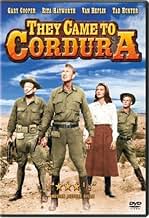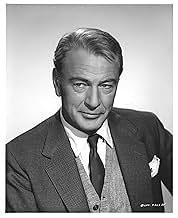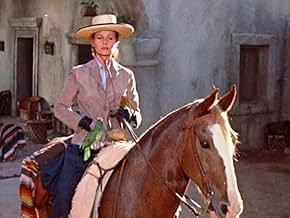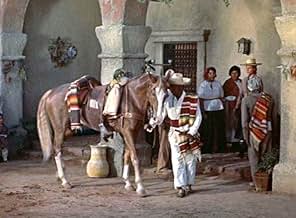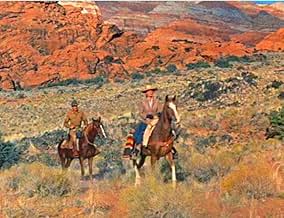Un major de l'armée, lui-même coupable de lâcheté, est invité à recommander des soldats pour la médaille d'honneur du Congrès lors de l'incursion à la frontière mexicaine de 1916.Un major de l'armée, lui-même coupable de lâcheté, est invité à recommander des soldats pour la médaille d'honneur du Congrès lors de l'incursion à la frontière mexicaine de 1916.Un major de l'armée, lui-même coupable de lâcheté, est invité à recommander des soldats pour la médaille d'honneur du Congrès lors de l'incursion à la frontière mexicaine de 1916.
- Réalisation
- Scénario
- Casting principal
- Récompenses
- 1 victoire et 1 nomination au total
- Capt. Paltz
- (as James Bannon)
- Cavalry Trooper
- (non crédité)
Avis à la une
In 1916, while World War I was occupying most people's attention, President Wilson was concerned with the continuous unsettled state of Mexico, then in the sixth year of it's Revolution. Initially he was delighted with the first head of the Revolution, Francisco Madero, who was trying to make the country a nation ruled by constitutional law. But in 1913, Madero was overthrown and murdered by the head of the Mexican army, General Huerta. Huerta had support by the then Ambassador to Mexico, a gentleman named Henry Wilson (no relation to the then President-elect), who openly cooperated in the assassination. After Woodrow Wilson was inaugurated, he replaced Henry, but the damage was done to Mexican-American relations. The new President was too ham handed to improve matters. In 1914 he had the Marines land at Vera Cruz after our flag had been insulted. Many lives were lost in this battle. Wilson worked to force Huerta out of his office. This brought him into considering someone to replace Huerta.
Why a puritanical prude like Woodrow Wilson thought of supporting Francisco "Pancho" Villa as the corrective to Huerta has never been adequately explained. Although the two men never met, it is inconceivable that Wilson would have found the hard drinking, bloody minded, and woman chasing Pancho as an ideal type to run Mexico. But he did, and for a year or so (until Huerta left Mexico) Villa was given arms and supplies from the U.S. This honeymoon lasted until a new figure arose - General Venusiano Carranza. Carranza (like Madero) wanted the adoption of a permanent national constitution to run the country. Wilson liked this (he did not notice that Carranza did not hesitate to feather his own nest while stressing the constitution. So in 1916 Wilson began aiding Carranza, and slowly ceased assisting Villa.
Villa was angered by this, and decided to teach the gringos a lesson. He raided the town of Columbus, New Mexico, killing about a dozen citizens. It was the first foreign invasion of American soil since the War of 1812, and would be the only invasion of the continental territory of the U.S. between 1814 and 09/11/2001. Wilson was furious, and demanded that President Carranza arrest the bandit/revolutionary. Wilson might as well have demanded that Carranza arrest the winds of Mexico. He had fought several battle against Villa, and knew that Pancho was no pushover. When Carranza gave some half-baked reason for not catching Pancho, Wilson decided to take the matter into his own hands: he sent troops into Mexico under General John J. Pershing to catch the bandit revolutionary. For a year or so Pershing tried to catch Villa, but the wily Pancho managed to keep escaping. Finally the U.S. troops were called back. Mexicans were incensed at American arrogance in invading their country (sound familiar?). The only good thing was that it enabled us to test our army out here, under if's future Expeditionary Commander's leadership, before we went into the European conflict.
Except, possibly, "The Three Amigos", this is the only commercially made film that is set in the Anti - Villa expedition of 1916 - 1917. As such it barely touches the reasons for the expedition. Instead it concentrates on Gary Cooper's assignment to find five men who should receive the U.S. Medal of Honor for gallantry and bravery in action. It is a cynical act by Washington, because 1) the purpose is public relations cosmetics for a botched armed intervention; and 2) Cooper's Major Thorn is actually given the assignment because he acted cowardly on the field of battle. For the Major to be given this quiet assignment is actual an insult - his own courage is being questioned.
Soon he finds a battle going on and picks out his five men (Van Heflin, Richard Conte, Michael Callan, Tab Hunter, and Dick York). This gives him some problems with an old friend, Robert Keith, who planned the attack, and hoped it would lead to him getting the award (actually, Cooper was only impressed at how slapdash and badly planned the attack was, and cannot think of it's architect getting any type of award as a result). Keith ends his friendship with Cooper as a result.
Taking his five men with him, Cooper starts trying to get to know them. He soon discovers that the men are not interested in the medal, and (as they have a long trek to Cordura, where they have to go to finalize the awards), Cooper learns that the men are not very noble at all. To worsen things, they capture a hacienda owner who is American (Rita Hayworth), who gave assistance to Villa's men. The woman reawakens sexual tensions and rivalries between the five men, as well as Cooper.
The film ends with Cooper and the men coming to turns (after several nearly deadly confrontations) with their own views of the values of true courage and it's being honored. It is not a dull matter, but one questions a full two hour about it. Because of the covering of this dismal incident of the diplomatic history of the U.S. and Mexico, and the acting (all the leads are good), and Rossen's direction - it is worth a "7" out of "10".
What is courage? What is cowardice? This is the story of his search for an answer.
That summary is the opening text from this oddly {to me} divisive picture from Robert Rossen and Ivan Moffat. Divisive because there are conflicts about it's technical aspects, its length {which cut is original?}, it's talky nature, and if it's splendid cast did the material justice? Well the dispute about the technical aspects being poor certainly don't stand up to the version I saw of the picture, lovely widescreen CinemaScope with Burnett Guffey's photography astutely and rightly oppressive as the story unfolds. As for its length, the version I viewed was two hours long, is this a restored cut or is there still another half hour of Rossen footage lurking somewhere? Either way, the complaint about there being gaps in the film are not evident in this two hour cut. All characters are fully fleshed and every minute of this picture was engrossing and perpetually watchable. The cast are also on fine form, Gary Cooper is perfectly cast as Maj. Thomas Thorn, the man who's moment of weakness hangs heavy round his neck like a curse. Van Heflin, Rita Hayworth, Dick York, Richard Conte and Tab Hunter all help to make this a fine character driven piece.
Above all else it's the story that works the best, Thorn is carrying around a burden as he strives to take these heroes to safety and ensure they receive their medals of honour. But the perilous journey proves to alter each man's attributes, be it despicable or otherwise, something that to me personally makes this a thematically excellent picture, the kind we could do with more of in the modern era. It may well be cynical at times, but really that is no bad thing in my eyes, it's a cop out of sorts I know, but this film isn't for everyone. After a fine battle sequence has been and gone, the film shifts in tone and becomes a picture about the complexities of man and his own personal hang ups, the result of which left me very much rewarded. 8/10
Also, confidence in people can change them and reform them.
The acting is superb throughout, and Gary Cooper captures wonderfully the gradual decline as he leads his motley crew on a trek to survival through the desert. An heroic performance to match the hero he portrays.
This is movie that deserves more acclaim than it has received.
In my book this is a must see. Great fare for Sunday afternoon on the couch!
Set in 1916, the film centres on a US military expedition deep into Mexico, a punitive response to Pancho Villa's raid on American territory. Gary Cooper plays Thorn, and though he invests his character with a certain quiet dignity, he can hardly be accused of acting.
Thorn is despatched back to the USA with a small group of men, each of whom is to be decorated for valour. As the Cavalry's Awards Officer, Thorn will have to prepare citations, and he obsessively quizzes the men about why they did what they did, how they felt at the time, and so forth.
Typically for a film of its era, "Cordura" assembles a melange of ethnic tokens, throws them into a difficult situation, then concentrates on the tensions and confrontations which result. Richard Conte is Truby, the crafty latin type, and Van Heflin plays Chawk, the angosaxon brute. Dick York is Renziehausen, the German American from (where else?) Wisconsin. Thorn is hoping to learn the secret of courage from his motley crew, but discovers that the answer to his question can only be found within himself.
Nice angles are developed to open out the plot's basic premise. A cavalry charge against the Mexicans looks like dashing American heroism, but might be no more than cynical fakery on the part of medal-hunting Colonel Rogers. Chawk might be an unfeeling ruffian rather than a hero. The arrival in the group of Mrs. geary (Rita Hayworth) complicates the issues, because the presence of a beautiful woman causes the men's interests to diverge.
The Mexican terrain is spectacular, and the film's central proposition is an interesting one, but the end product is so-so. It is difficult to warm to Cooper as an actor, or indeed to his character. Tab Hunter (as Lieutenant Fowler) goes way over the top. Thorn's sudden perking-up beside the rail track is a ludicrous event.
Verdict - Would-be essay on the wellsprings of human courage peters out into humdrum adventure yarn.
Le saviez-vous
- AnecdotesAlthough Gary Cooper was 57, his character Major Thorn was forty years old according to the novel. Early in the film it is mentioned that Thorn's father had recently been killed while still on active service.
- GaffesMajor Thorn improperly salutes Colonel DeRose in the opening scene when he is dismissed. He should have saluted and held his salute until it was acknowledged. Instead, he lowers his arm even before Colonel Rose acknowledges it.
- Citations
Major Thomas Thorn: Did you ever see the Medal of Honor?
Private Renziehausen: No, Sir.
Major Thomas Thorn: It's the most beautiful decoration of all, as it should be. I'd trade an ear for one any time, two in fact.
Private Renziehausen: Excuse me, Sir, but I'd rather have the ear.
- Crédits fousOpening credits prologue:
On the night of March 8th, 1916, a large mounted force of Mexican rebels under Pancho Villa crossed the American Border and attacked the town of Columbus, New Mexico, killing and wounding both American civilians and soldiers.
As a result of this action,the United States Army sent an expedition into Mexico with orders to capture Villa and disperse his forces.
It was during this campaign that one man, an United States Army officer,was forced to come face to face with two of the great fundamental questions that affect mankind:
What Is Courage? What Is Cowardice?
This is the story of his search for an answer.
- ConnexionsFeatured in Stars of the Silver Screen: Rita Hayworth (2011)
Meilleurs choix
- How long is They Came to Cordura?Alimenté par Alexa
Détails
Box-office
- Budget
- 4 000 000 $US (estimé)
- Durée
- 2h 3min(123 min)
- Couleur
- Rapport de forme
- 2.35 : 1



